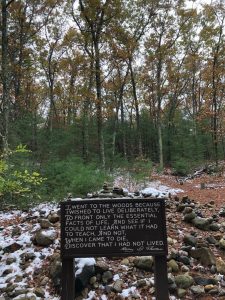Every year, MLK Jr Day and Tu Bishvat live near each other on our calendars. A holiday that celebrates trees and a holiday that honors a civil rights giant do not, on the surface, have much in common. Yet, Jewish text has a long history of connecting seemingly disparate topics, allowing for each topic to enhance and build upon the other. In putting the below thinkers in conversation with each other, perhaps we might find a connection that deepens our understanding of both.
 Of the many picturesque ponds that dot the outskirts of Boston, Walden Pond is perhaps the most famous of them all, thanks to Henry David Thoreau. The author and naturalist spent just over two years living in the woods by the pond as part of his quest to live simply, outside of the confines and trappings of society. His cabin no longer stands, but the spot is marked with a stone cairn created by visitors to the spot, along with a sign on which Thoreau is quoted:
Of the many picturesque ponds that dot the outskirts of Boston, Walden Pond is perhaps the most famous of them all, thanks to Henry David Thoreau. The author and naturalist spent just over two years living in the woods by the pond as part of his quest to live simply, outside of the confines and trappings of society. His cabin no longer stands, but the spot is marked with a stone cairn created by visitors to the spot, along with a sign on which Thoreau is quoted:
“I went to the woods because I wished to live deliberately, to front only the essential facts of life, and see if I could not learn what it had to teach, and not, when I came to die, discover that I had not lived.”
Standing at the cabin site on a visit to Boston, listening to the wind in the trees, looking up at the changing leaves, and reading Thoreau’s words, I was reminded of two other teachers whose words we recall in this season.
Rabbi Nachman of Bratslav, who also “went to the woods”, offered this prayer: “Master of the Universe, grant me the ability to be alone; may it be my custom to go outdoors each day among the trees and grass – among all the growing things. And there may I be alone, and enter into prayer, to talk with The One to whom I belong…and may all the foliage of the field, all grasses trees and plants awake at my coming, to send the powers of their life into the words of my prayer, so that my prayer and speech are made whole through the life and spirit of all growing things, which are made as one by their transcendent Source.”
On the surface, Bratzlav’s words describe a simple practice – the power of individual prayer in a natural space. But in fact, his message teaches far more about universality and connectedness. In going out among the trees, he invites those trees, and grasses, and plants, to participate in prayer with him. His words alone are not enough – it is only through the combination of his speech and the “power of life” of those grasses, trees, and plants that his prayer made whole.
Tu Bishvat reminds us of this interconnectivity between adam (people) and adamah (earth), between of humans with the wholeness of creation. When we are at odds with each other, we threaten the future of the natural world – and our own. When we work in partnership, our words are made whole, and God hears our prayers.
Rev. Dr. Martin Luther King Jr. understood this interconnectivity too – in Atlanta in December 1967, he taught: “If we are to have peace on earth, our loyalties must become ecumenical rather than sectional. Our loyalties must transcend our race, our tribe, our class, and our nation; and this means we must develop a world perspective.”
Dr. King recognized that this call to transcend race, tribe, class, and nation would not be easy (just as, if we are honest, it is not always easy to go to the woods and talk to God!) But as with Thoreau, who sought to ensure that when he came to die, he did not “discover he had not lived,” doing the hard work was imperative. As Dr. King put it: “A man dies when he refuses to stand up for that which is right. A man dies when he refuses to stand up for justice. A man dies when he refuses to take a stand for that which is true.” (March 8 1965)
Tu Bishvat reminds us of our interdependence. Dr. Martin Luther King Jr calls on us to act on that interdependence.
This year, may we venture into the woods and into partnership with our earth, that our prayers may become whole,
and may we commit to pursue justice, in partnership across lines that seek to divide, that our world may become whole.



